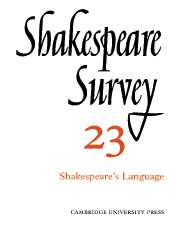Book contents
- Frontmatter
- Shakespeare and the Tune of the Time
- Some Functions of Shakespearian Word-formation
- Guide-lines for Interpreting the Uses of the Suffix ‘-ed’ in Shakespeare’s English
- Shakespeare’s Use of Colloquial Language
- Words, Action, and Artistic Economy
- ‘Antony and Cleopatra’: the Limits of Mythology
- Shakespeare’s ‘War with Time’: the Sonnets and ‘Richard II’
- Shakespeare and Christian Doctrine: Some Qualifications
- Shakespeare’s Poets
- The Text of Coleridge’s 1811–12 Shakespeare Lectures
- Shakespeare Studies in German: 1959–68
- A Neglected Jones/Webb Theatre Project: ‘Barber-Surgeons’ Hall Writ Large
- Interpretation or Experience? Shakespeare at Stratford
- 1 Critical Studies
- 2 Shakespeare’s Life, Times, and Stage
- 3 Textual Studies
- Index
- Plate section
Shakespeare and Christian Doctrine: Some Qualifications
Published online by Cambridge University Press: 28 March 2007
- Frontmatter
- Shakespeare and the Tune of the Time
- Some Functions of Shakespearian Word-formation
- Guide-lines for Interpreting the Uses of the Suffix ‘-ed’ in Shakespeare’s English
- Shakespeare’s Use of Colloquial Language
- Words, Action, and Artistic Economy
- ‘Antony and Cleopatra’: the Limits of Mythology
- Shakespeare’s ‘War with Time’: the Sonnets and ‘Richard II’
- Shakespeare and Christian Doctrine: Some Qualifications
- Shakespeare’s Poets
- The Text of Coleridge’s 1811–12 Shakespeare Lectures
- Shakespeare Studies in German: 1959–68
- A Neglected Jones/Webb Theatre Project: ‘Barber-Surgeons’ Hall Writ Large
- Interpretation or Experience? Shakespeare at Stratford
- 1 Critical Studies
- 2 Shakespeare’s Life, Times, and Stage
- 3 Textual Studies
- Index
- Plate section
Summary
Mr Roland Mushat Frye’s brilliant and belligerent Shakespeare and Christian Doctrine must be taken seriously; I have no wish to controvert much that he says. The passion for finding Christ-figures in Shakespeare is not one I share. The evidence he adduces is scrupulously presented, and I agree with many of his conclusions. At times, however, the evidence means something different to him from what it means to one who habitually reads other literatures than English.
I begin with his appendix on the Valladolid copy of the First Folio, castigated by Father William Sankey S.J. on behalf of the Spanish Inquisition. Mr Frye regards these expurgations as evidence of how Shakespeare was officially regarded by the Roman church in the seventeenth century. If by that he meant how certain passages in Shakespeare were officially regarded by the Roman church I should endorse his opinion. Mr Frye takes Father Sankey's erasures, etc. in isolation; I want to try to compare them with the treatment of similar Spanish texts by Roman Catholic authors.
The censorship took place between the years 1641 and 1651. During this time the Spanish public theatre came under heavy ecclesiastical fire, and many of its most bitter opponents were Jesuits. Theatres in Spain were closed by law from 7 October 1644 until Midsummer 1645 and from 9 October 1646 until June 1649.
- Type
- Chapter
- Information
- Shakespeare Survey , pp. 79 - 90Publisher: Cambridge University PressPrint publication year: 1970



